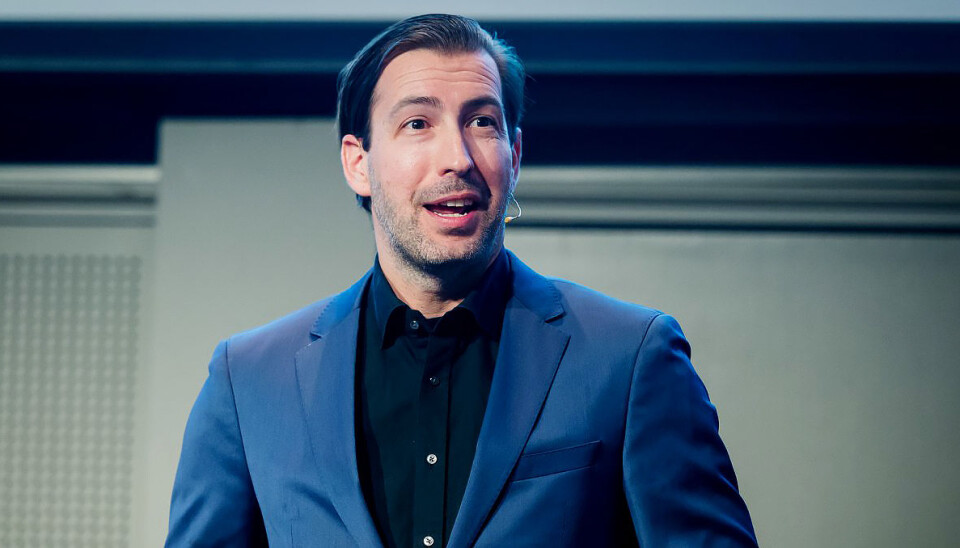-

Senior Software Engineers - Frontend & Backend | Hornet
-

Medeier* | Boitano
-

Engineering Manager | Handelsbanken
-

Erfaren mobilapp-utvikler | Handelsbanken
-

Fullstack-utvikler | Norad
-

Lead Data Engineer | Norad
-

Product Owner Investeringskjerne - Bergen/Oslo | DNB
-

Innovation-to-Market Specialist | Highsoft
-

Product Owner | DNB
-

Data Engineer, Data Core team | NBIM

Sean Percival: "How to bury your startup and get on with your life"
By Sean Percival. An American author, investor and entrepreneur working in Norway. He’s the author of The Loud American: Working with Norwegians, a guide book to help foreigners and Norwegians be better at doing business together. Here, on Shifter he gives candid answers to common founder questions.
Closing up a business is going to be emotional and stressful for everyone involved. But there is life after death, writes investor and startup mentor Sean Percival.
You have been pushing that boulder up the hill the best you can but let’s face it. It’s just not getting there. Your startup and you are out of gas. And we say that ironically of course in a country with plenty of oil and gas. Still, the end is here and it’s time bury the idea and move on. This is not always so easily done here in Norway, a country where society discourages risk- taking, making it tough for the prideful Norwegian to admit they failed.
First things first –there is absolutely nothing wrong with crashing your startup.
It’s all part of the very natural cycle of innovation. It’s the iteration of both people and ideas that over time that may eventually produce something great. A lot of investors like to joke that they would rather invest in someone's second startup, after they have done all their screwups and the lessons are learned from their first. After crashing a few startups you probably know everything you need to do it right.
I’ve crashed startups several times, from tiny bootstrapped projects all the way to big venture-backed journeys. In Silicon Valley this happens many times every day and it's generally accepted. Today a startup dies but tomorrow its people get quickly snapped up or start something new altogether. The amazingly efficient ways talent and money can recirculate makes Silicon Valley unique – this simply doesn’t exist elsewhere. In the Valley it’s OK to fail; you might even go so far as to say that failure is embraced there. One could literally “fail up” their entire career, getting smarter and stronger with each failure. I certainly have to some extent.
Of course things are very different here in Norway. Capital doesn't yet flow as effectively into startups and there’s more social pressure to avoid failure here. Thanks to Janteloven, there’s a lot of pressure on those bold enough to strike out from the pack and create a company. Failure gives Norwegian society an easy opportunity to push you back down to their level, creating a weight that no doubt hangs heavy on the Norwegian founder of today. These founders make up the first generation since the oil boom and before that the early 1900s to think in a truly entrepreneurial way. They take more risks than their parents did. In this unique cultural situation of Norway, admitting your idea has failed can be significantly tougher than elsewhere. You especially don't want to admit failure to friends and family who have supported you.
Paradoxically, this cultural environment exists at the same time as everyone in Norway is trying to orient the economy around entrepreneurship. We always want to see everything as super positive! Everyone's idea should be applauded and many startups should, according to this thinking, be financially supported by the government. This is true even when sometimes it might be a better to be more critical of Norwegian founders who are clearly not developing a viable business. Norwegians are not known for being overly polite, but when it comes to bad startup ideas they still shower praise. As a result, I see a lot of very smart people working on very bad ideas for far too long here in Norway. That means good talent gets locked up when it could be doing something much more impactful.
So here’s something different for you: instead of a guide on how to build your startup, here’s a few tips on how to bury one and get on with your life. For when it's clear it didn't work and the end has arrived, when the money and energy has all run out. How can one survive this very natural part of the startup lifecycle?
It’s all about integrity.
As I mentioned before, it’s absolutely fine to crash your startup... just do it with integrity. Closing up a business is going to be emotional and stressful for everyone involved. So tread lightly and approach it with trust and transparency. Share openly with staff and investors the exact position of the company and your clear reasoning behind shutting it down. Thank everyone who supported you and ensure they are taken care of.
Thankfully, Norwegians are in most cases very trustworthy and transparent already. They are also very pragmatic. So ending your startup as gracefully as possible is especially important. In a small country people talk and word travels fast. You would much rather people say, “Yes, it’s unfortunate things didn’t work out but he/she did their best” than something like “Wow, yeah that was a total shit show all the way to the end.” So be honest and fair as you do, at least the best you can as things are collapsing around you.
What about my investors?
Good investors know that not all their investments are going to work out. Experienced investors have seen it all before, so hopefully you won't be dealing with a lot of blowback. It will probably be much less than you are expecting. However all investors, whether experienced or not, hate being surprised. So keep lines of communication open with them during both the life and death of your business. This is why you should always send short monthly updates after any investor joins up. That way they can see the trajectory of the business (good or bad), and they will not be surprised by sudden news that the business is closing. If the shutdown is well managed and clearly communicated, you might even be able to raise money from them again.
When I shut down my last venture-backed business, I was terrified to send that final email to my many investors. I expected them to be fuming mad and hate my guts. However, in the end, the majority were very supportive and understanding. One investor even hired me shortly after. There is life after death it seems.
Then what’s next?
To start with take a big, deep breath. Everything is going to be fine and you’ll live to ride the startup roller coaster once again. Everyone gets a second chance, especially in startupland. Some people get many chances. It may not feel like it today – it may feel instead like you had your one shot and blew it – but that’s just not the case. Success is the ultimate redemption and if you continue to work hard you’ll have your chance again.
You’ll probably also feel a huge sense of relief the moment you make the decision to shut the business down. Much of that stress and worrying and your to-do lists can be thrown out the window, giving you the energy and focus you need to figure out exactly what's next.
If you have the financial means, take some time off. Travel and eat good food and make a few new friends or find some new lovers. If you’re completely wiped out financially from living the life of a founder, do what it takes to stabilize things quickly. That might mean consulting, or even worse, taking a cushy corporate job. Do whatever it takes to rebuild a foundation for yourself. I recommend doing this before jumping back into startup life. Without a pause and chance to reset your batteries you may find yourself in the same situation again far too soon.
But I still feel like crap and am having many bad feelings. What should I do with them?
Failure is one of the best learning experiences you can have as a founder. Unfortunately, it’s just a lot to go through emotionally, and you’re going to have many feelings surrounding it. Sometimes the best thing you can do with those feelings and with what you're learning from failure is to share them. This will help you to get your feelings off your chest, and if you share what you are learning with other founders, they can learn from your mistakes, too. This takes the form of a “startup post mortem” where you share openly about what happened and any lessons learned. You may actually find that writing about a failure is incredibly therapeutic. And if you need some inspiration, check out a few well done post mortems from Shyp, Circa, and Everpix. In this case, sharing is quite literally caring. Let it out and start to get on with your life.
Oh, and better luck next time!



